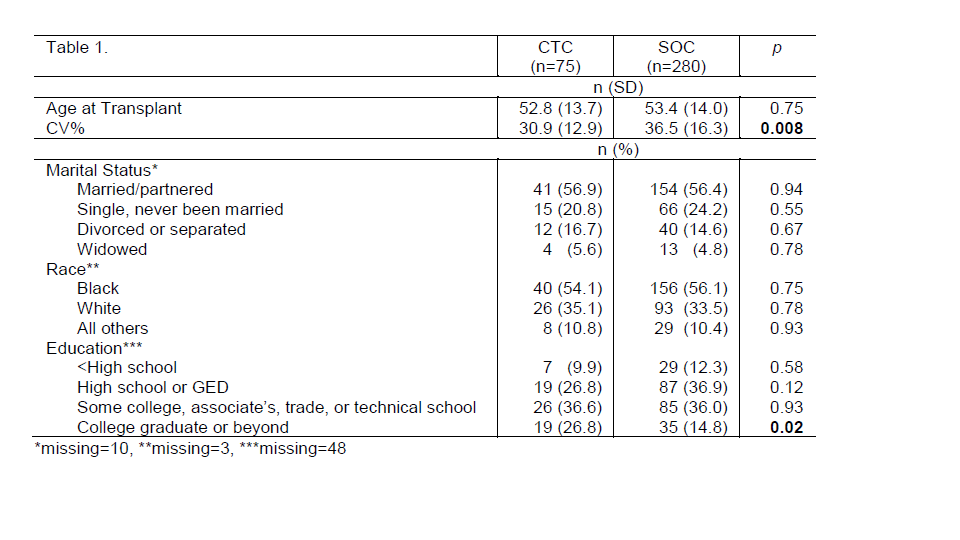Pre-Renal Transplant Education and Psychosocial Evaluation Positively Impacts Post-Transplant Medication Adherence
M. Jesse1, D. Kim1, A. Patel1, R. Patil1, S. Bhavsar1, S. Desai1, K. Gartrelle1, A. Eshelman1, E. Fleagle1, D. Nicholson1, E. Clifton2
1Henry Ford Health System, Detroit, MI, 2University of Michigan, Ann Arbor, MI
Meeting: 2020 American Transplant Congress
Abstract number: 288
Keywords: Kidney transplantation, Psychosocial
Session Information
Session Name: Psychosocial and Treatment Adherence
Session Type: Oral Abstract Session
Date: Saturday, May 30, 2020
Session Time: 3:15pm-4:45pm
 Presentation Time: 3:51pm-4:03pm
Presentation Time: 3:51pm-4:03pm
Location: Virtual
*Purpose: An essential element of the organ transplant evaluation process is the preparation of transplant candidates and their social supports. However, approaches to this process varies across institutions as there is sparse empirical support for pre-transplant interventions that include educational and/or psychosocial evaluation on long-term outcomes in kidney transplant populations. The purpose of this study was to examine the impact of a novel, multicomponent pre-renal transplant clinical protocol on post-transplant medication adherence.
*Methods: Retrospective chart review of kidney transplant candidates who participated in a novel clinical process improvement (the Countdown to Transplant Clinic: CTC) compared to a cohort of kidney transplant recipients who received standard of care (SOC) at a large Midwestern transplant center. The CTC was developed and implemented for kidney candidates nearing transplant and their social supports. The CTC included an enhanced educational session on lifestyle changes after surgery and evaluations by psychology, social work, and nephrology. The goals of the CTC were to identify and address potential psychosocial barriers to successful outcomes before transplant occurred and prepare candidates and their social supports for post-transplant lifestyle changes.
*Results: Between November 2016 and March 2018, 114 patients participated in the CTC and, as of 11/14/2019, 75 received transplants. Compared to SOC patients (all patients who underwent transplant between 2012 and 2015, n=280), there was a significant difference in the coefficient of variation (CV%) of tacrolimus serum blood levels (a validated proxy for patient medication adherence) 3- to 12-months post-transplant indicating better immunosuppressant medication adherence in patients who participated in the CTC. While there were more college educated patients in the CTC, there was not a significant difference in CV% between educational categories (p=0.69). There were no significant differences between the patients who participated in the CTC and SOC on age, marital status, race, or dialysis history (table 1).
*Conclusions: Even when accounting for other social determinants of medication adherence, the findings of this study provide support for multidisciplinary education, evaluation, and intervention prior to kidney transplantation.
To cite this abstract in AMA style:
Jesse M, Kim D, Patel A, Patil R, Bhavsar S, Desai S, Gartrelle K, Eshelman A, Fleagle E, Nicholson D, Clifton E. Pre-Renal Transplant Education and Psychosocial Evaluation Positively Impacts Post-Transplant Medication Adherence [abstract]. Am J Transplant. 2020; 20 (suppl 3). https://atcmeetingabstracts.com/abstract/pre-renal-transplant-education-and-psychosocial-evaluation-positively-impacts-post-transplant-medication-adherence/. Accessed February 25, 2026.« Back to 2020 American Transplant Congress

